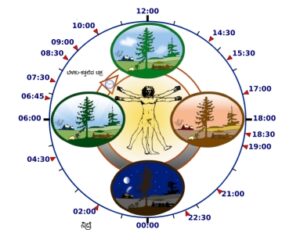
Circadian rhythms are physiological rhythms in humans and other animals which last approximately 24 hours. The term is derived from the latin “circa”, meaning about, and “dia”, meaning day. Examples of circadian rhythms are the sleep-wake-cycle and cycles of hormone production, such as those of cortisol and melatonin. The term circadian rhythms was coined by Franz Halberg in 1959.
Source:
Butkov, L., Mattice, C., Brooks, R. (2007). “Fundamentals of Sleep Technology (Second Ed.)“. Wolter Kluwer/Lippincott William & Wilkins, p. 61